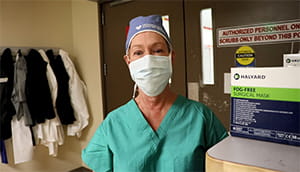What is a Nurse Practitioner
November 16, 2018
What do you do as a nurse practitioner?
Before the patient goes into surgery, I take down their history and do their physical, as well as get them to sign a consent form – all of the important paperwork. When they have surgery, I assist the surgeon, Dr. Fredric Pieracci, in the operating room. I then see all these patients at one week, one month, three months, six months and a year after their surgeries.
I am also involved in training our future doctors how to be efficient workers, how to write proper orders and how much pain medicine to give.
What is the difference between a nurse practitioner and a nurse?
Nurse practitioners came from the nursing model. I was a nurse for 25 years. The knowledge I draw on to make decisions every day is more rooted in all the nursing I did before I became a nurse practitioner. Nurse practitioners originally worked under their own licenses and theoretically, they could have their own outpatient clinics (with a consulting physician) and work as independent practitioners.
What is the difference between a nurse practitioner and a physician’s assistant?
We are very similar, but physician's assistants have different training and are more physician-focused. Originally, they worked underneath a doctor’s license and they worked only in the hospitals, while nurses worked in outpatient clinics. That is no longer the case.
What is the difference between a nurse practitioner and a doctor?
Nurse practitioners can take care of about 80 percent of the patients that doctors can see, helping to reduce their patient loads and leaving the physicians free to see more complicated cases. Physicians tend to be very diagnosis-oriented; nurse practitioners – because we come from a nursing model – tend to look at the whole body when treating a patient, using a more holistic approach. For example, we are not just looking at high blood pressure, but whether there is something in the environment that’s causing it.
What type of training/schooling do you go through to become a nurse practitioner?
You start off with a bachelor’s degree, then it’s a two-year process to get your Master’s of Science Degree in Nursing. There are several branches you can go into; I chose family practice, so I’m a Family Nurse Practitioner; there are also acute care nurse practitioners, psychiatric nurse practitioners and pediatric nurse practitioners. The first nurse practitioner was in pediatrics.
How is your role as a nurse practitioner vital to the care of the patient?
We offer more because we start with nursing. Often times, our patients become family to us, because we are more involved with what’s going on with them and have more time to spend with them than a doctor does.
Nurse practitioners have only been around since the 1980s – why is there a need for the role?
There are just not enough doctors to go around, especially with the underserved, when they are having a hard time getting in to see a doctor; we can see them and treat them the same as a doctor can, if not better.

Why did you become a nurse practitioner?
I have worked in the operating room for most of my life, and when I became a nurse practitioner, I wanted to see the patient before they went into surgery, be with them in the operating room and then care for them after surgery.
Another reason is now I have the ability to write prescriptions and actually make the decisions, rather than having to find someone else to do that for me.
As a bariatric nurse practitioner, you see dramatic changes in your patients. How rewarding is that to see?
It is rewarding. My patients become my family. When they start the program, they look completely different than they do at the end of it. Sometimes, I will recognize the voice and not necessarily the face because the face changes so much when you lose weight.
Manage Your Healthcare From Anywhere, At Any Time
Create a New Account
Existing MyChart Account



